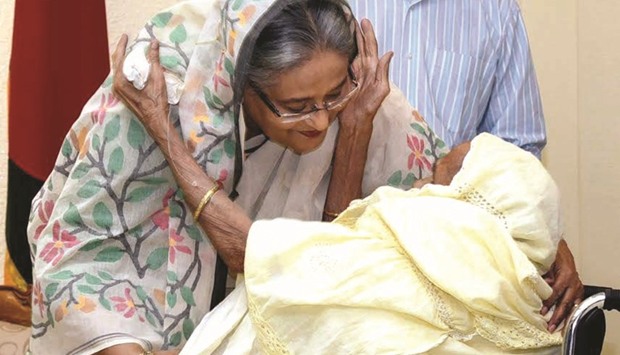The prime minister gave a cheque of 300,000 taka to each of the 12 recipients, PM’s press secretary Ihsanul Karim said.
Earlier, the government increased allowances of those awarded for gallantry, war-wounded freedom fighters and families of the martyred freedom fighters.
Those who have been receiving more than one allowance until now will be allowed to avail themselves of the higher allowance, said cabinet secretary Mohammad Shafiul Alam.
Valiant freedom fighter Taraman Bibi will get allowance under “Bir Pratik” category, he said.
There are seven Bir Sreshtha, 68 Bir Uttam, 175 Bir Bikram and 426 Bir Pratik gallantry award winners.
The number of families of martyrs receiving allowance is 25,000 while the number of war-wounded (now dead) freedom fighters’ families is 303 and families of Bri Sreshtha are seven.
Provident fund for informal sector workers: In a major move for workers’ welfare, Bangladesh has introduced provident fund for millions of informal sector workers not covered under the country’s labour law.
Initially, 100,000 workers will be covered under the provident fund, officials said in Dhaka.
The labour and employment ministry will tie up with post office and financial institutions, mostly banks, shortly in this regard, they added.
According to the scheme, formulated under a provision of Bangladesh Labour Welfare Foundation Act 2006, workers remaining out of the purview of existing labour law will be entitled to provident fund facility.
There are more than 40 industrial sectors including garment, leather, pharmaceuticals, jute, ship-breaking, cold storage, plastic, chemical, fertiliser among others. These come under formal sector where rights of workers are protected by the labour law.
But farm labourers, domestic helpers, construction workers, street vendors, cottage industry workers, sweepers, cleaners and security personnel are not covered by the labour law. This means they are involved in informal work.
Labour leaders, however, said a vast majority of the country’s labour force is still deprived of their legitimate rights due to lack of proper laws and their enforcement.
According to the leaders, nearly 90% of the workers in informal sectors are not allowed to form trade unions under the existing laws.
There are many workers in informal sectors including farmers, blacksmiths, carpenters, rickshaw-van pullers, domestic workers, construction, electric, shoe, steel and engineering, welding workers, security guards, cleaners, tailoring workers and hawkers. But they do not work under any regulated bodies, labour secretary Mikail Shipar told newsmen.
The scheme that has been finalised defines workers of informal sector as those who are not protected by the labour law and who have limited scope of being organised, he added.

